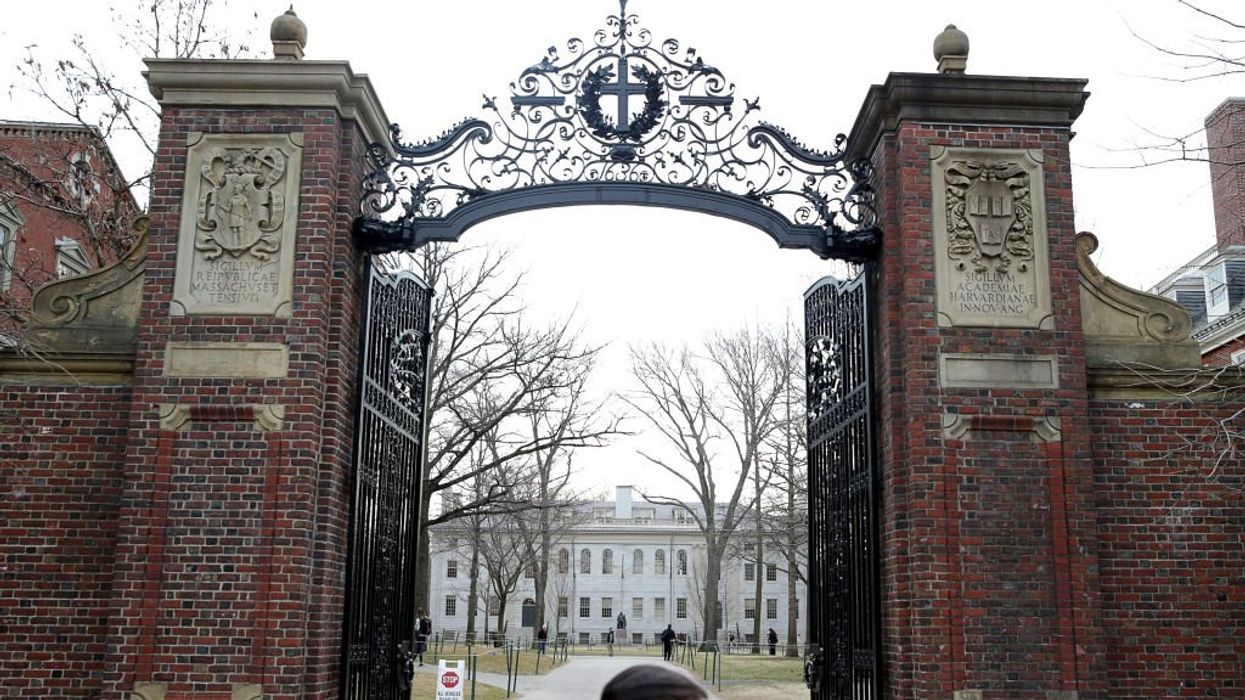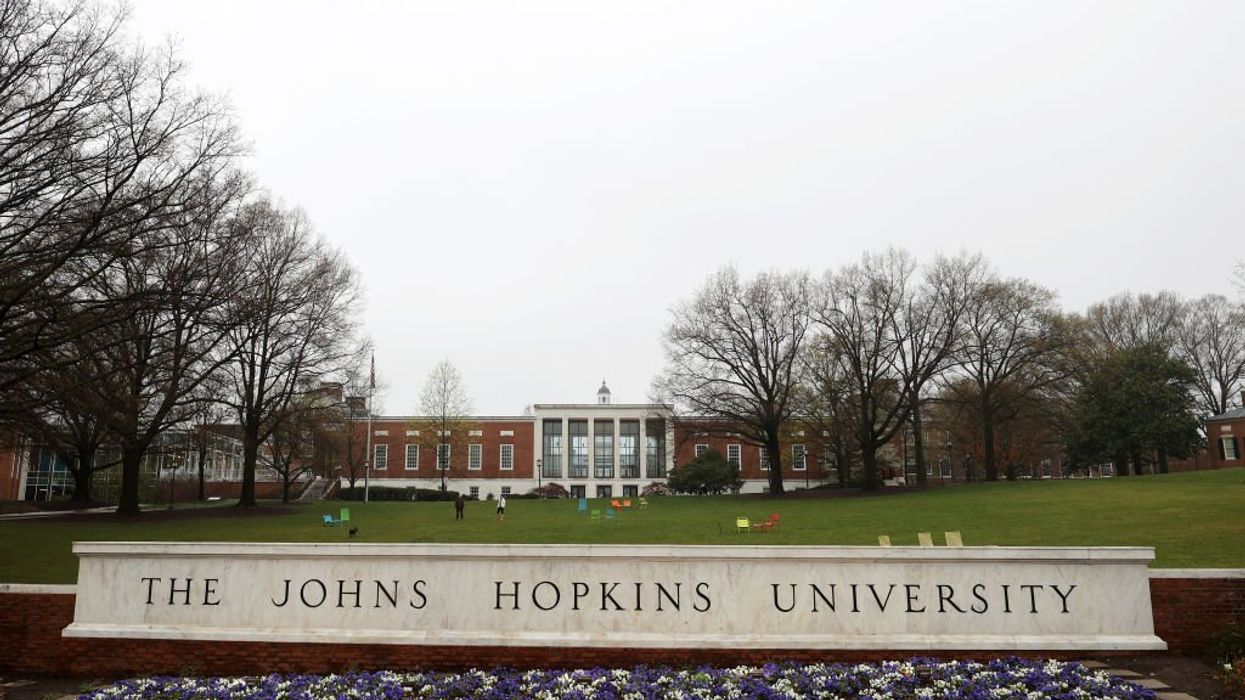A new trade deal is making its way through Congress, and Congressman Dave Brat has a lot of concerns about some of the provisions in the bill. The unusual thing about this bill is that many strong conservatives are lining up on opposite sides of the fence. Some are for it, like Ted Cruz, Marco Rubio, and Ben Sasse. But Dave Brat and Mike Lee oppose it. Rep. Brat shared light on the issue on Thursday's radio show.
LISTEN:
GLENN: There are two things going on in the country that I just don't know what to make of. And one of them is Jade Helm. I just don't know what to make of that. I just don't know what to make of it. The other is the TTP. This is the Trans-Pacific Partnership. And there's no sunlight on it. And usually you can say, okay, well, who is for it, who is against it? Ted Cruz, Marco Rubio, James Inhofe, Ben Sasse, Tim Scott, David Vitter, Joni Ernst, and James Risch -- is it Risch or Risch?
PAT: No, it's Risch.
GLENN: Risch. James Risch of Idaho, ranked the most conservative member of the Senate. That's saying something.
PAT: And they're for it. Right?
GLENN: They're for it. For it.
Against it, a guy who I think is one of the best constitutionalists in the Senate, Mike Lee. Rand Paul. Jeff Sessions. Richard --
PAT: Who sucks. Wait. Senator Jeff Sessions or --
GLENN: Yeah.
PAT: Okay. That's different.
GLENN: Richard Shelby of Alabama and a whole bunch of liberals.
PAT: I was thinking Pete Sessions who sucks.
GLENN: Yeah. So they voted against it in the Senate.
PAT: That's weird. That's weird.
GLENN: So I just don't know who to believe. Now, Dave Brat is the guy who beat Eric Cantor in Virginia and is in there really doing the right thing. I mean, so much so that Eric Cantor is already looking for somebody to run against him in 2016. I mean, just wants to get him out of there. So he's standing up every step of the way. Which way -- where do you stand on this, Dave?
DAVE: Hey, Glenn. Yeah, I'm a firm "no" on the thing for, you know, about ten reasons we can get into. But the number one is what you just said, you got to go into a security bunker to read the thing. And I've done that. When you come out, I'm not supposed to say what's in it. And I'm called a representative of the people, and it's hard to represent the people when the people don't have views because they can't read it. So the process problem is number one.
And I think after the Pelosi model of, you know, passing a bill to find out what's in it, I hope we've learned. So I'm a true conservative in the sense, if we don't know what's in it, you don't vote yes.
GLENN: Okay. So I agree with you on that, Dave. Now, I talked to Ted Cruz on this. He went into the box. He was greatly disturbed. He said, I read it. I didn't find anything that was horrible in it. He said, and it has a sunlight provision in it, for it to pass, it does have to have 60 days of sunlight. Is that true?
DAVE: Yeah. That's correct. But the end of the sentence is, there's a 60 day sunlight provision where you get to find out what's in it, and then the Congress gets an up-or-down vote as a whole. Well, you guys probably covered the doc fix. And on that thing, our leadership can go to Democrat leadership and find 300 votes, and it's a done deal. And worse than that, our guys have dug into it. Mick Mulvaney and Jim Jordan have done great work on this thing. And there are actually five high hurdles to stopping this thing. So basically if we vote yes -- the best way to think about this thing is just a locomotive train. Right? If we hit go, that train is going forward, and there's no stopping it.
GLENN: Okay. What's in it that's wrong?
DAVE: Well, that's the issue. Senator Sessions has been good on this thing. It's a living document. The scariest part of it is that it creates this Trans-Pacific Partnership Commission. And that commission will likely have the authority to not only change its membership and the agreement itself, but to issue regulations relating to immigration, environmental policy, currency policy, labor policy. It's an open-ended commission. And that's why I was using that locomotive analogy. Once you start that train down the road, in order to stop it, you have to go to noes in order to stop it from Ways and Means, the Rules Committee, Senate Finance, and the House and the Senate. So there's five votes you need to stop it. So our conservative group, the Freedom Caucus, with Jim Jordan and all these guys, we're trying to change the direction of that thing so that any member can stop it. And, you know, more resembles -- where any member can stand up at any time and say, that's a bunch of junk you're adding to it.
GLENN: So let me ask you this, Dave. You have Ted Cruz who is just lightning strong. You have Jim Inhofe who does not fool around. Ben Sasse has been really good. James Risch of Idaho has been really good. How are these guys on the other side of the fence? Have you talked to any of them?
DAVE: Yeah. I mean, I've talked to guys. My own caucus -- I mean, if you're in a district where agricultural is huge or shipping is huge or whatever, you know, to represent your constituents, some of them, you know, you have 11 countries. You lower tariffs a little bit more. Make trade a little easier. You know, I'm a free trader, you know, so that's the good side. But the conservative impulse is, okay, you have the trade part. But in this day and age, the first few words are the key. We'll give trade authority to President Obama. And that's the -- that's the big asterisk. So we're going to give more authority to a president who has already done a run around us on executive amnesty, on the IRF, and the list just goes down and down and down. Breaking promises on Obamacare. EPA overreach, et cetera, et cetera, et cetera. Some guys are in districts where trade is huge, and they're representing their people, which is their job. And so, you know, different representatives really do have a tough votes (phonetic) at times. But in my view, there's too many noes in this thing.
STU: Dave, we're a country that loves its whistle-blowers. Isn't there a responsibility for somebody, whether they're allowed to tell us what's in this thing or not, to tell us what's in there? This is our government.
DAVE: Well, WikiLeaks has pumped a bunch of it out there. So, I mean, it's getting around. The issue has more to do -- just last week President Obama hinted that maybe China will enter this thing. Well, that's a little detail, right, I mean, whether China joins. Maybe that matters. And the implications of these things are huge. So kind of ironically, Donald Trump I think has it right on trade. The US is getting rolled around the world by Russia, by China, and by the Middle East, and especially on trade.
And so trade properly viewed should be one powerful tool along with our military, our foreign aid budget, our university, our immigration system. What the US says to the rest of the world, hey, you behave and follow free markets and the rule of law and, you know, we'll all get rich together. If you do not. You're not part of the -- but no one, especially our CEO now, the executive and the president is using all the power of the United States of America for the good of the country. We're just treating it like a little narrow trade agreement that will lower tariffs a little bit and add to the bottom line for some companies. And, you know, I'm all for that. But my job is to represent the country, not just, you know, special interests.
GLENN: Okay. So people know. If you don't know who Dave Brat is, Dave is the representative from Virginia. He's the guy who beat Eric Cantor. But more importantly, he has a PhD in economics and a masters of divinity. So at least -- I haven't asked you the soul question, Dave. But, you know, at least on paper, your soul is doing fine.
DAVE: Yes.
GLENN: And you're -- and you're a PhD in economics, so you can -- you can read these things and look at them and say, this is going to affect us here, here, and here.
DAVE: Yeah. Well, the two are related. I mean, if you believe in God, you learn humility is one of the first things that you learn, that you're not the center of the universe. In the economics, there's a guy named Hayek, who is one of the fathers of the free market economics. And the book he wrote is called the Fatal Conceit. And the fatal conceit is to think that I'm smart enough to walk in a room and read 400 pages of legalese and believe it and know everything that's in a trade bill that's 400 pages long and digest it with everything that can go wrong. Right?
One of the good things about our two-party system is you can debate and you learn from each other. And that's what needs to happen in this process. We need to debate and duke it out and see what's good in this thing and what's a bunch of junk.
GLENN: That's what Ted said to me. He said, Glenn, quite honestly, I'm a guy who can read these bills and understand them. He said, but you can't go into a room and read something, you know, 400 pages and come out the other side having any idea what it really says. He said, that's why it needs sunlight. He said, I believe that when it's exposed, that's when people of interest will start going out and there will be teams all over the country looking at this bill. And that's when we really find out what it really means. He said, none of us can find out what it really means.
DAVE: Right. If he said that, he should -- in my mind, I mean, that's a no vote.
GLENN: Well, he said, the reason why is because you have to have it have sunlight. He said, look, I'm not opposed in principle. I don't want to speak for him. But he said, I didn't see anything that was glaring. He said, but I don't think I would. But that 30 or 60 days of sunlight is what's required to be able to understand it.
DAVE: Right.
GLENN: So then he told me that that's what's built into this, that there's 60 days of sunlight.
DAVE: Sixty days of sunlight, but then it's an up-or-down vote for the whole thing. So our 40 guys on this Freedom Caucus we got, which is a great group of faith guys and Constitution guys, we want it the other way around. We have eight checkpoints along the way, that if anybody lies, the bill is dead right there. You don't come to the end -- I mean, you know how D.C. works. Right? I came in at the end of last session on the cromnibus, and it was just loaded with junk. So 80 percent good or whatever, 20 percent bad. And in this city, that's -- you just vote, yeah. Right? That's called good governance. Dave learned how to govern. Just vote yes on everything.
GLENN: Did you see, Dave, anything? And I don't know if you can answer, obviously I look to you. But did you see anything in there that you thought was dangerous, besides -- did you see -- let me change this. Did you see anything in there that gave you any reason to believe that jumped out to you that said, this should be confidential? This should be behind closed doors?
DAVE: No, no. To be accurate to both sides of a good debate, I mean, the reason these trade agreements have some degree of secrecy is because you're debating prices, right? Tariff rates, which are basically prices. And every price has a good side and a bad side. Right? If you're a producer, you like a high price. If you're a consumer, you like a low price.
If you throw all those prices out in public, I mean, you'll have a food fight. So to give the benefit of the doubt to the other side on that kind of an issue, you want secrecy on the prices. But on the process, when you have a thing called a Trans-Pacific Partnership Commission, I want to know the power that's given that commission. And that part should surely be debatable. There's no reason we can't debate the process issues out in public without mentioning all the prices and stuff because, you know, that's where the 11 countries will, you know, have differences. You have to sort that out.
GLENN: All right. So Friday is the day. The vote happens tomorrow. And, Dave, what should people do? Should we call our congressmen?
DAVE: Yeah. Right. Ask your congressmen to explain to you what they know about it. And if they don't tell you anything, say, I don't trust the current regime. And I want to a no vote out of you. I mean, that's what -- the phone calls coming into my district are 21 against. And I'm voting my constituents and my principles. And in a year, if we sort this thing out and it becomes transparent and everything's fine, I'm a free trader, I'll vote yes. But right now -- Obamacare, right, it was so -- it was going to lower costs. Read the first sentence of Obamacare. Right? It will provide insurance to more people, and it will lower costs. Well, it didn't lower the costs. Everybody has the check in the mail now. You learn the hard way. And you have a $5,000 deductible. Oops. We didn't know that going in, in our talking points. And I'm worried the same thing can happen in this trade deal. Oops. There's a little deal in there, and we missed it. Well, that's not good governance.
GLENN: Okay. Dave, I really appreciate it. Thank you so much.
DAVE: Hey, if your folks want to help me out a little bit too, it's DaveBrat.com.
GLENN: You didn't even need Pat.
PAT: No, he was right there. He was right there.
GLENN: DaveBrat.com. Thank you very much, Dave. Good to have good guys in Congress. Thank you. I will tell you, I think I've come to my first thing with Ted Cruz that I think I disagree with him on.
PAT: Yeah, it's a close one on this.
STU: To point the other side, when you're citing Donald Trump as an expert on trade, I don't think I'm with you on that one. I think I would side with Ted and against Dave based on that. Because Donald Trump is not --
GLENN: Yeah. When I say this -- yeah, I agree with you on the Donald Trump thing. But when I say to you it's secret, do you trust these guys?
PAT: No.
GLENN: No. No, I don't.











